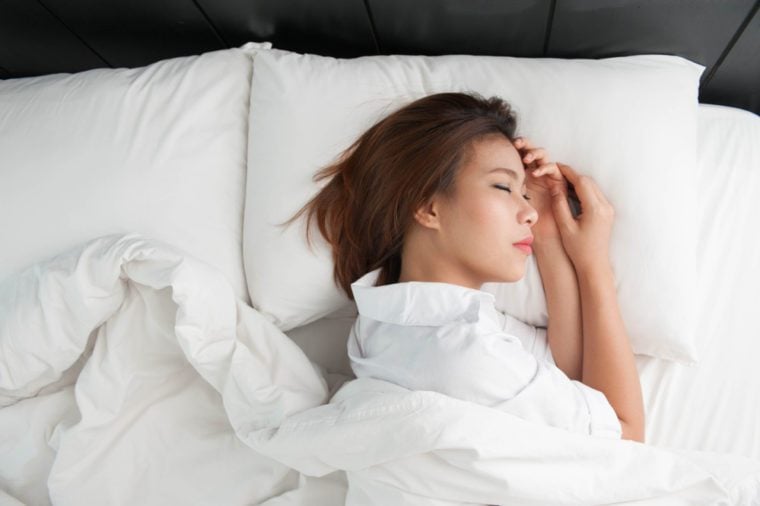Let’s face it, sleep deprivation or lack of sleep on a regular basis can take a toll on your mental and physical health. That’s why it’s crucial to get not only a sufficient amount of sleep but also quality sleep. And that brings us to the importance of deep sleep, which refers to one of your later sleep-cycle stages (Stage 3) during the first few hours of slumber. Deep sleep can help restore your energy while improving the immune system as well as promoting bone and tissue repair in the body. That said, here are 8 Useful Tips To Get A Restful Deep Sleep.
1) Stay Away From Caffeine Before Bed
Caffeinated beverages like coffee, tea and espresso are no doubt a popular pick-me-up drink that helps to give you a much-needed boost of energy. So, you can imagine the effect it might cause if you consume them close to bedtime. But unless you are planning to burn the midnight oil, it’s best to avoid caffeine altogether. Here’s why: caffeine is a known stimulant capable of remaining in your blood for around 6-8 hours after consumption. Not to mention caffeine is diuretic, which not only affects your beauty sleep but also likely to jolt you awake for late-night bathroom trips.

2) Avoid Using Smartphones During Bedtime
If you love to use your smartphone in the dark while lying on the bed, it’s time to reconsider your action. The blue light that emits from your phone screen can mess up your natural circadian rhythm in the long run. The least you can do is to download a blue light filter where it works by filtering the blue light and reduces eye strain. Or better yet, stop using your phone when it’s time to go to bed.

3) Stick To A Consistent Sleep Schedule
Irregular sleeping patterns and those who frequently love to burn the midnight oil are prone to poor sleep quality, which is why it’s important to maintain a regular sleep schedule by getting into the habit of waking up and going to bed at the same time every night. Yes, even on weekends. By doing so, you will do your body’s circadian rhythm a huge favour in shaping your sleep-wake cycle. It’s like a clock responsible to tell your body when it’s time to wake up in the morning and when to go to bed at night.

4) Make A Habit To Exercise Regularly
If you have trouble sleeping all the time, take a hard look at your current situation. Is it because of your sedentary lifestyle regardless of day or night? Then, the best thing you can do is to get some regular exercise such as a morning jog for around 20-30 minutes a day. Not only it gradually improves your overall sleep quality but also reduces your stress levels and helps with insomnia. While regular exercise helps to promote deep sleep, just remember not to work out too late in the day or close to bedtime to avoid possible sleep problems.

5) Your Mattress Matters
Sure, some people able to sleep soundly anywhere – even on a bamboo mat or concrete floor. But most of us need a proper mattress to ensure our nightly sleep is not compromised. If your mattress starts to sag or sink down in the middle, it’s time to consider a replacement. Choosing the right mattress can be extremely subjective since everyone has their own preferences. For instance, some prefer a softer mattress while others might opt for the firmer type. Still, the general rule of thumb is to go for the medium-firm mattress — the best play-safe method that isn’t too soft or too hard but just feels just right. This particular type of firmness brings the right balance of body support and cushioning, where it provides sufficient comfort for those who often complain of back or neck pain while sleeping. To choose the right mattress, check out this guide from SleepStandards.com.

6) Avoid Heavy Meals Before Bed
Eating heavy food such as burgers and fried chicken too late in the night or close to bedtime is basically a recipe for disaster. Why? Because your stomach would have to take a longer time to digest and makes it difficult for you to relax and go to bed.

7) Use Sleep Tracker Apps
Technology can be absolutely helpful if we know how to make good use of it. This certainly rings true for some of the sleep tracker apps that can be (mostly) downloaded for free via Google Play (Android) or App Store (Apple). It basically helps by accurately calculating the amount of sleep duration that you need to get a restful slumber. Here are some of the best examples you should consider downloading on your phone: Sleep as Android, Sleepo and Sleep Time.

8) Lay Off Any Liquids Before Bed
Imagine you are supposedly having a good night’s sleep until your bladder starts acting up at 3 am in the morning, urging you to make a bathroom trip. We’ve all been there and yes, it can disrupt our sleep quality. And most possibly, this happens when you often drink large amounts of water or any liquids close to bedtime. So, the best thing you can do is try to refrain from drinking any liquids at least 1-2 hours before bed. Or better yet, make a habit of minimising your fluid intake in the late evening.
















